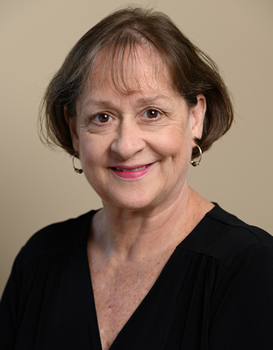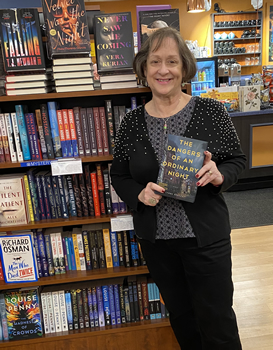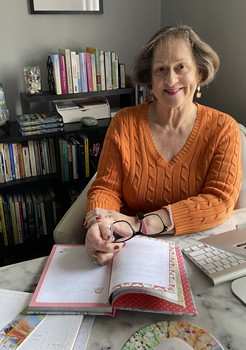

On the Cover: Lynne Reeves
Danger Lurking in the Ordinary
 By Dawn Ius
By Dawn Ius
The old adage “write what you know” has taken on new meanings over the past few years—from the necessary and welcome emergence of #OwnVoices stories through to issues of cultural appropriation, gender equality, and much more.
But sometimes, the adage’s original intent—sticking to a subject that you know a lot about—is still one of the clearest paths to writing an authentic novel. That is certainly true for Lynne Reeves, an internationally recognized family counselor, public speaker, author, and theater lover.
In her latest novel of domestic suspense, THE DANGERS OF AN ORDINARY NIGHT, Reeves’s love of theater and drama creates the rich backdrop for a thrilling mystery that encompasses many of the themes she has dealt with in her non-writing career—addiction, dysfunctional family dynamics, codependency, and much more.
The story kicks off with the disappearance of two teen best friends, Tali Carrington and June Danforth, who go missing after auditioning for a play at a prestigious performing arts high school in Boston. Two days later, Tali is found alive by the ocean’s edge, disoriented and traumatized. June is pronounced dead at the scene.
What follows is a fast-paced tale that twists and turns toward the truth through the eyes of three points of view—Tali’s mother, Nell; Detective Fitz Jameson; and reunification therapist Cynthia Rawlins—all of whom must decide what lengths they’ll go to protect their own secrets and the scandals that bind them.
In this interview with The Big Thrill, author Lynne Reeves delves deeper into what inspired this suspenseful read, the ways she weaves in “what she knows,” and her opinion on why domestic suspense continues to outpace most genres.
THE DANGERS OF AN ORDINARY NIGHT is more than just a suspenseful read—you really delve into a number of issues that families struggle with—addiction, codependency, the pressures on kids to succeed. How has your career as a marriage and family counselor influenced your writing?
Inherent in my work is listening carefully to people, and I’ve learned so much about the human condition by paying attention to themes as they emerge. James Joyce once wrote, “in the particular is contained the universe.” It’s true that we are alike in the way we experience love, joy, and suffering, and still what happens to us is uniquely personal. I would be a completely different writer if it weren’t for my work as a counselor. Our most precious relationships are at the core of everything I write. Family is endlessly fascinating to me, and without my preoccupation with it, my stories would not be the same.
Domestic suspense remains one of the most popular genres—Gone Girl truly paved the way for this genre and continues to remain one of the most popular titles. Why do you think the genre resonates so well with readers?
We live in uncertain times. Yet exploring our fears and insecurities requires energy and insight—and in order to reflect deeply, we need to feel safe to do so. The domestic suspense genre allows readers to do all of this work at a remove. When you explore the mental health issues in children, or the impact of addiction on marriage, in a high-stakes, fast-paced novel, you can learn so much about what you think and how you feel about the subject matter and the way it plays out in your own life. The novels I love most allow readers to grapple with some of life’s biggest challenges from the point of view of fictional characters who feel real, and who make choices I can relate to. Well-crafted stories don’t make difficult questions easier to answer, just easier to ponder.
This is one of those cases where the title really gives us a clue about the book’s premise, the idea that your life could crumble around you at the most unassuming and ordinary time. I’d love to hear a bit about what inspired this novel.
I was a happy 15-year-old enjoying my life when my father died suddenly of a heart attack while on a business trip with my mother. From that point on, my family would never be the same. Anyone who’s experienced the unexpected death of someone they love—or any trauma that comes seemingly out of the blue—knows the feeling of being blindsided never goes away. It begins a cycle of wondering, what would my life be like if this hadn’t happened? Who might I have become? Of course, these are questions without answers. We are the sum of our experiences, good and bad. I’m a writer because of the pain of losing my father. The through line in my work is grief, and yet my stories have allowed me to connect with readers in profound and beautiful ways.
THE DANGERS OF AN ORDINARY NIGHT is heavy on the suspense. And don’t even get me started on that fantastic twist! The Big Thrill is as much for aspiring authors as it is for readers. What advice would you give for tricks in creating suspense?
For writers of all genres, but especially domestic suspense, I encourage them to write what they are dying to know but afraid to find out. It’s the writer’s job to raise questions readers want to wrestle with, and we do it by creating tension on every page, working through the messy lives of complex characters. Exploiting every element of craft, the writer engages in a delicate dance of creating compelling story questions that put readers on edge while not confusing or frustrating them. It’s this very discomfort over what’s about to happen and what characters stand to lose that keeps readers turning pages. Write from what frightens you.
I understand that you’re a tremendous drama and theater fan. THE DANGERS OF AN ORDINARY NIGHT is set at a performing arts school—what did you want to capture about that environment and why was it the perfect setting for the book? (I loved that each chapter is given the title from a play.)
I’ve always known I would write about the theater. It turns out it’s the perfect backdrop for a story about the masks we sometimes wear when it comes to our deepest fears and our closest relationships. I wanted to explore marriage, and what happens when we stop seeing each other. I chose to examine high pressure parenting, and why we feel the need to create contrived personas instead of revealing our most authentic selves to our children.
What is your favorite theater experience? Have you ever considered writing a play?
I have so many favorite experiences. The first Broadway show I saw with my sister in New York (My Fair Lady). The evening I brought my son and daughter to their first show (Godspell). Seeing Duncan Macmillan’s People, Places, & Things and having it reaffirm what an exquisite vehicle theater is for examining the way we live now. Fun fact: the original ending of THE DANGERS OF AN ORDINARY NIGHT was in play form. Let’s just say a wise friend suggested I stay in my lane.
Fitz and Cyn are really fleshed-out characters, with great chemistry. Any chance you’ve considered revisiting them to kick off a series?
In writing my other novels, by the time those stories concluded, I’d felt there was nothing more the characters had to tell me. At the end of THE DANGERS OF AN ORDINARY NIGHT, Fitz and Cyn are at the beginning of something, with lots of unfinished business to contend with. Though I’m not sure I’ll tackle a series, I’m absolutely open to writing about them again.
What can you share about what you’re working on next?
My next novel of domestic suspense is due out next year. Dark Rivers to Cross is a story about identity, adoption, and the impact of bearing witness to violence. It’s a novel about what one woman is willing to do to save her children from their traumatic origin story. It’s also about how society views mothers caught between impossible choices.
- Africa Scene: Iris Mwanza by Michael Sears - December 16, 2024
- Late Checkout by Alan Orloff (VIDEO) - December 11, 2024
- Jack Stewart with Millie Naylor Hast (VIDEO) - December 11, 2024




